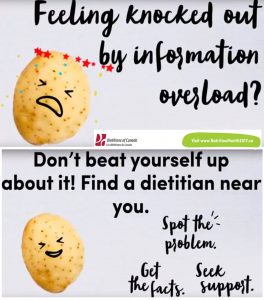Say no to food fads this #NutritionMonth *
Did you know that one in two Canadians get their food and nutrition information from the internet, social media and blogs? Let’s face it. Not everything we read online is true. And while many of us know that, it’s still easy to be taken in by popular ideas we see online or hear from friends. How can we really separate food fact from fiction?
Misinformation affects many of Canadians, but there is a way to spot your problem and seek reliable facts to solve it. So if you’re wondering how to make sense of the nutrition advice you read online and want nutrition facts you can trust, I’m going to walk you through an example of a three-step problem-solving approach that was developed for Dietitians of Canada’s Nutrition Month 2017 campaign Take the Fight out of Food, which works quite well for nutritional concerns.
#1 Spot the problem: There is so much nutrition information online and you are not sure how to tell if something is a fad!
#2 Get the facts: You know that some websites are more reliable than others. For example, a resource on the Dietitians of Canada website that can help you determine if facts you read online are accurate. You may read websites and absorb information, but not all of it may be true. Be more critical and ask yourself these questions when reading a website:
- Is the website promising a quick fix or a miracle cure?
- Do I have reasons to mistrust the person, organization or company that runs the website?
- Are they trying to sell me something instead of educating me?
- Are the website writers unqualified to be giving me nutrition information?
- Do they have facts that sound too good to be true?
- Does the information come from personal opinions rather than scientific evidence?
- Is the content missing reviews or verification by medical experts?
- Are the website claims based on a single study that may draw the wrong conclusion?
Now if you know that if you answers “yes” to even some of these questions, the website may not be reliable.
#3 Seek support: You should not trust everyone who has an opinion about food and nutrition. Instead, look for sites that aren’t trying to sell you something and that rely on science rather than opinions. Check the credentials of the writers, and look for sites written by regulated health professionals whose work is reviewed by other experts.
Don’t get knocked out by information overload! Find a dietitian at www.dietitians.ca/find for advice. You can also browse this website and here is a list of other sites which are filled with reliable information:
www.dietitians.ca
www.eatrightontario.ca
www.healthlinkbc.ca
www.healthycanadians.gc.ca
www.dietitians.ca/Media/Member-Blogs.aspx
Do you have a food fight that you struggle with? Try the three-step approach to Take the Fight out of Food and make your commitment official at www.nutritionmonth2017.ca.
*Blog based on Dietitians of Canada Nutrition Month 2017 resource. #NutritionMonth
